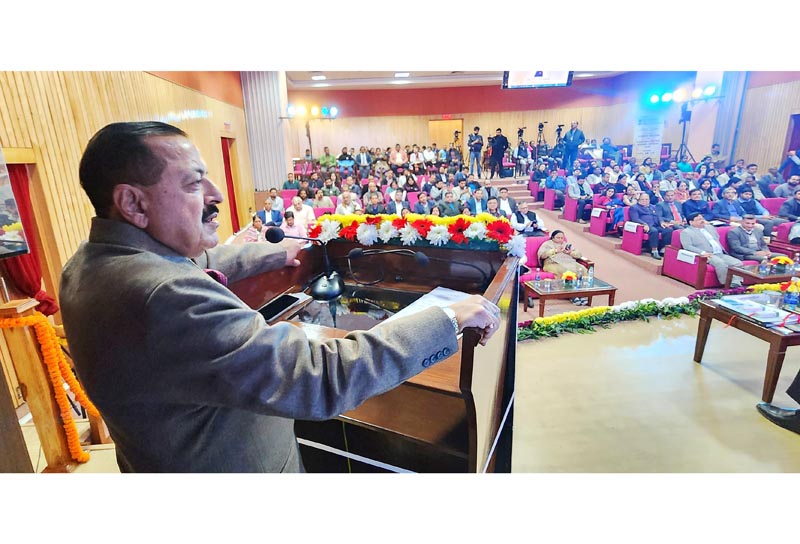Excelsior Correspondent
NEW DELHI, Dec 16: In a significant address, Union Minister of State (Independent Charge) for Science and Technology and other key departments, Dr. Jitendra Singh, emphasized the advantages that can be gained from integrating traditional knowledge with modern technological advancements.
Speaking at the celebration marking five years of the Science and Heritage Research Initiative (SHRI) organized by the Department of Science and Technology, the Minister highlighted the potential of this fusion as a unique strength for India in realizing Prime Minister Narendra Modi’s vision for a developed nation by 2047.
Dr. Jitendra Singh praised India’s heritage as a reservoir of knowledge that includes nearly 5 million ancient manuscripts, palm-leaf inscriptions, and numerous historically significant monuments like Konark, Khajuraho, and Chola temples. He noted that these elements are strong indicators of India’s scientific ingenuity and architectural excellence. “No other country boasts such an extensive and ancient repository of wisdom. This is our unique strength that we must leverage to take a global leadership position,” he stated.
The Minister pointed to key projects under SHRI, including non-invasive heritage preservation methods, the digitalization of the Ajanta caves, and restoration of artifacts. He asserted that these initiatives not only safeguard India’s legacy but also demonstrate how heritage and technology can collaborate for societal advancement.
Dr. Jitendra Singh reaffirmed the government’s dedication to merging traditional knowledge with innovative technologies, a principle advocated by Prime Minister Modi. He noted India’s progress in harnessing its heritage alongside modern science, highlighting milestones such as the establishment of the Ayush Ministry, Aroma Mission, and Hydrogen Mission. The government’s efforts to digitalize traditional knowledge with the Traditional Knowledge Digital Library (TKDL) provide global researchers access while ensuring proper protection against misuse.
He showcased successful integrations, such as the Lavender Revolution achieved through CSIR’s Aroma Mission, which greatly improved the economic conditions of farmers in Jammu and Kashmir, and projects like the Deep Sea Mission and Hydrogen Mission that are inspired by India’s environmental heritage. “These initiatives illustrate how India’s traditional wisdom can augment contemporary scientific solutions to modern challenges,” he elaborated.
Moreover, Dr. Jitendra Singh underscored the necessity to align scientific innovation with employment opportunities, stressing the importance of traditional crafts and skills. He encouraged better coordination between government programs like the Pradhan Mantri Vishwakarma Scheme and heritage preservation initiatives. This scheme, he explained, provides artisans with training, resources, and financial aid to ensure the sustainability of traditional crafts as viable sources of income.
At the event, Dr. Jitendra Singh presented a range of innovative products and technologies developed through the Science and Heritage Research Initiative (SHRI), each epitomizing the initiative’s aim of combining traditional knowledge with modern advances. A key highlight was the launch of Kosh Shree, a comprehensive Sanskrit dictionary and article authoring tool that operates on a crowdsourcing framework. This software enables collaborative creation of Sanskrit content online, thereby enhancing the preservation and accessibility of India’s ancient language.
The Minister also showcased Sakshatkar, a coffee table book celebrating India’s rich contributions to global science and technology over the ages, offering an engaging look into the nation’s scientific legacy.


Leave a Reply